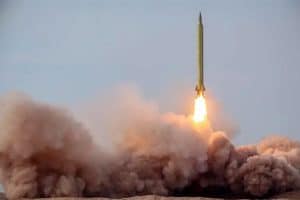I have been writing about Iran for over twenty years. In 2005, I took a trip to Iran to verify the "ground truth" about that country, a truth that I later incorporated into a book, "Target Iran," exposing U.S.-Israeli collaboration to develop a rationale of a military attack on Iran intended to bring down its theocratic government. I followed this book with another, “Dealbreaker,” in 2018, which updates this U.S.-Israeli effort.
In November 2006, in a speech at Columbia University's School of International Relations, I emphasized that the United States would never abandon my "good friend" Israel, until, of course, , we do it. What could precipitate such action, I asked? I pointed out that Israel was a country drunk on pride and power, and that unless the United States found a way to remove the keys from the ignition of the bus that Israel was driving to abyss, we would not join Israel on its lemming-like suicidal journey.
The following year, in 2007, in a speech to the American Jewish Committee, I pointed out that my criticisms of Israel (which many in the audience took great offense to) came from a concern for the future of Israel. I highlighted the fact that I had spent the better part of a decade trying to protect Israel from Iraqi missiles, both during my service in Desert Storm, where I played a role in the campaign to counter against SCUD missiles, and as a United Nations weapons inspector, where I worked with Israeli intelligence to ensure that Iraqi SCUD missiles were eliminated.
“The last thing I want to see,” I told the crowd, “is a scenario in which Iranian missiles hit Israeli soil. But unless Israel changes course, this is the inevitable result of a policy dictated more by arrogance than common sense.”
On the night of April 13 to 14, 2024, my fears came true live in front of an international audience: Iranian missiles fell on Israel and the latter could do nothing to stop them. As had been the case just over 33 years earlier, when Iraqi SCUD missiles overcame American and Israeli Patriot missile defenses to strike Israel dozens of times in the space of a month and a half, Iranian missiles, part of an attack plan designed to overwhelm Israeli missile defense systems, struck designated targets inside Israel with impunity.
Despite the use of a large integrated missile defense system consisting of the so-called "Iron Dome" system, US-made Patriot missile batteries and Arrow and David's Sling missile interceptors, as well as US aircraft , British and Israeli and American and French on-board missile defenses, more than a dozen Iranian missiles struck heavily protected Israeli airfields and air defense installations.
The Iranian missile attack on Israel was not launched out of the blue, so to speak, but rather in retaliation for the April 1 Israeli attack on the Iranian consulate in Damascus, Syria, which killed several senior Iranian military commanders. Although Israel has previously carried out attacks against Iranian personnel inside Syria, the April 1 attack was notable not only for the deaths of top Iranian officials, but also for the fact that it struck what was legally speaking sovereign Iranian territory – the Iranian consulate.
From the Iranian point of view, the attack on the consulate constituted a red line which, in the absence of retaliation, would erase any notion of deterrence, opening the way to even bolder Israeli military action, possibly going as far as direct attacks against Iran. The retaliation, however, is balanced by a complex set of interlocking policy objectives that would likely be challenged by the type of large-scale conflict between Israel and Iran that could be precipitated by a significant Iranian retaliatory attack on Israel.
First, Iran has engaged in a strategic policy based on a pivot away from Europe and the United States and toward Russia, China, and the Eurasian landmass. This change is due to Iran's frustration with the economic sanctions policy led by the United States and the inability and/or lack of will on the part of the collective West to find a path that would allow to lift these sanctions. The failure of the Iran nuclear deal (the Joint Comprehensive Plan of Action, or JCPOA) to produce the type of economic opportunities that were promised when it was signed has been a major driver of this Iranian pivot toward 'East. Instead, Iran joined the Shanghai Cooperation Organization (SCO) and the BRICS forum and devoted its diplomatic energy to the full and productive integration of Iran into these two groups.
A general war with Israel would undermine these efforts.


 April's missiles
April's missiles